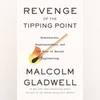)
REVENGE OF THE TIPPING POINT: Overstories, Superspreaders, and the Rise of Social Engineering
By Anand Giridharadas
REVENGE OF THE TIPPING POINT: Overstories, Superspreaders, and the Rise of Social Engineering
Click here to connect with us on WhatsApp
Author: Malcolm Gladwell
Publisher: Little Brown
Pages: 352
Price: $32
Malcolm Gladwell could have written a fresh book. Instead, he created a brand extension of his 2000 hit, The Tipping Point.
The result, Revenge of the Tipping Point, is a genre bender: Self-help without the practical advice, storytelling without the literariness, nonfiction without the vital truths, entertainment without the pleasure, a thriller without actual revelation and a business book without the actionable insights.
But it will be big! For Gladwell’s books belong to that special category where books are not books so much as advertisements. Revenge of the Tipping Point might get you to sign up for Gladwell’s MasterClass course on storytelling. It might lead you to Pushkin Industries, the podcast company he helped start. Or it could inspire a business to hire him to give the new talk his speaking agency is already marketing on “how not to miss the forest for the trees.”
My criticism isn’t that Gladwell speaks to a wide audience. That is what I admire most about him. He is the literary equivalent of those politicians who get non-voters to the polls. With legacy media eroding and book sales sluggish and disinformation spreading and truth under attack by some of our own leaders, millions of people live in idea deserts. For them, Gladwell is a farm stand.
The problem is that he has chosen to be a farm stand that serves salty, fatty, sugary pseudo-thinking. His signature methodology is to convey relatively boilerplate, already well-known ideas, by rebranding the ideas and wrapping them in stories.
Some may find the faux-thriller construction annoying, but I believe it is necessary as a subsidy to, and concealer of, weak-sauce ideas. In his earlier books, Gladwell at least coined catchy rules of thumb, even if their validity was questionable. But in Revenge of the Tipping Point, even the rules have the consistency of a slushy.
For the best writers, writing is about questions, propelled by doubt and self-correction and the endless revision of one’s mind. But in Gladwell’s books, especially this one, a kind of Framework Supremacy is the driving force, forming and deforming the reality he describes. He becomes committed, for example, to what he calls the Magic Third: The notion that one-third of a group is a critical mass. Writing about women on corporate boards, he cites a study that things get more hospitable to women when three of them are serving together. Then he notes, in spite of considerable evidence that boards come in a range of sizes, that boards are “a group of (typically) around nine experienced businesspeople.” This use of “typically” and “around” is a small sleight of hand, and it serves him well.
Now that he has his study on the number three and his harmlessly dubious number nine, Gladwell can allow himself to be surprised at the amazing coincidence he created: “Three out of nine people. The Magic Third!” He soon pronounces the Magic Third “a universal law.”
Sometimes Gladwell’s stories are interesting, even if years behind the public discussion on his subjects. But they are marred by this desire for Newtonian laws. At one point, he tries to wring from two stories — a Medicare fraud case and the education of Americans about the Holocaust — a common lesson about how things spread. The lesson: “Overstories are far more volatile than they appear.” Do we really need a single, overarching law of nature to explain why people defraud the elderly and also why Holocaust remembrance increased?
The subtitle of the original Tipping Point captured Gladwell’s worldview: “How Little Things Can Make a Big Difference.” It was a very nineties approach. Think tanks had big faith in the small tweak on a large scale. Targeted tax cuts, broken windows, free trade. Globalisation promised that neoliberal tinkering would produce butterfly effects to the benefit of all.
The world has changed. On the left and right alike, there has been a loss of hope in the perfect tweak. So when Gladwell, writing about corporate boards, says that “it doesn’t always take a revolution to change the way a minority group is perceived,” there is quaintness to it.
He loves ideas like how you can improve outcomes for minority kids by bunching several into one classroom, or how you could get more Black women on boards by getting them to the Magic Third levels of South Asian women. But he will rarely ask why schools so fail minorities, or why South Asian women have had an easier time on boards than Black women.
In one passage, he does a word count on a 1961 book called Contemporary Europe: A History, to measure what it ignored — how many times did it mention the Holocaust or concentration camps? A similar analysis of his own book would reveal that he is uninterested, in spite of a focus on social epidemics, in “authoritarianism,” “fascism,” “disinformation,” “lies,” “nationalism” and “white supremacy.”
If a book is a business, avoidance makes sense. As a member of Taylor Swift’s entourage put it to her, why halve your audience? The topics Gladwell avoids are also unpopular with companies that book speakers.
Gladwell has the independence to go deeper and tell us hard truths and upset the status quo. When that clout is used to hawk Frameworks™, not seek complexity, to mine universal laws from anecdotes, not confront the present, to croon the old hits for your fans, what’s good for the brand is a loss for writing. If Taylor can do it, so can he.
The reviewer is the author, most recently, of The Persuaders: At the Front Lines of the Fight for Hearts, Minds, and Democracy.
First Published: Sep 30 2024 | 10:08 PM IST


































